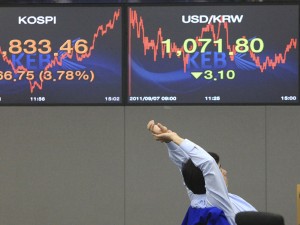SINGAPORE—Oil fell in Asian trade Tuesday after a bearish Standard and Poor’s report on the United States, but geopolitical risks in the Arab world will continue to drive prices higher, analysts said.
New York’s main contract, light sweet crude for delivery in May dipped 17 cents to $106.95 a barrel, while Brent North Sea crude for June eased one cent to $121.60.
Victor Shum, a Singapore-based analyst at Purvin and Gertz international energy consultancy, said oil prices were weighed down by ratings agency Standard and Poor’s decision to cut its outlook on US sovereign debt to “negative”.
The ratings downgrade on Monday raised doubts about Washington’s ability to tackle its huge debt and fiscal deficits.
“The downbeat outlook has caused a selling out, with oil and stocks included,” Shum told AFP.
But concerns over the unrest sweeping the Arab world and its impact on oil supplies in the crude-producing region are expected to keep prices high, he added.
“Given the geopolitical risks involving oil, I don’t expect a sharp correction in prices,” he said.
“The supply disruption in Libya is real as are the threats of further uprising in the other parts of oil-producing Middle East and North Africa.”
In Libya, more than 100 people have been killed in 24 hours in the rebel-held Al-Jabal Al-Gharbi district west of Tripoli after it was pounded by Gadhafi forces, residents told AFP on Monday.
There was also a scramble to rescue refugees trapped in the besieged port city of Misrata.
A ferry rescued almost 1,000 people from Misrata on Monday and Britain said it plans to pick up 5,000 more, as UN officials said Moammar Gadhafi’s government has guaranteed “safe passage” for foreign aid workers and to let a UN mission into the city.
The safe passage was part of an accord on humanitarian access to the capital and other Libyan cities secured in Tripoli on Sunday by UN humanitarian chief Valerie Amos, said deputy UN spokesman Farhan Haq.
Unrest in the Arab world has already toppled the leaders of Tunisia and Egypt and has spread to such countries as Yemen and Syria.


